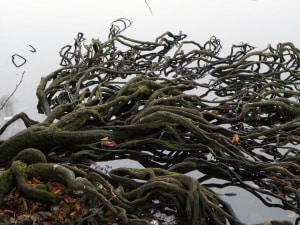Imagine a sin. A sin you can’t give up. Maybe a habit you’ve tried to kick, or a pattern you’ve tried to break. You get new resolve every once-in-awhile to try to change, and you break free for a little while. Or maybe you make a New Year’s resolution, and you see decent success until Martin Luther King’s birthday.
But then you fail. Giving into the temptation feels good, but then you feel empty and shameful. You don’t want to admit your failure, so you don’t call your friends. But in your isolation, you lose your resolve to fight when you face temptation again. Thus the cycle continues.
As I have seen this pattern take shape in our Destino community, I’ve been frustrated as I’ve seen people make mistakes that I’ve made. I’ve been angry when I realize that a friend of mine is basing his actions on lies. And I’ve wept as I’ve seen people do things that have consequences that will last a lifetime and even affect other generations. We’ve started a conversation with our leaders about this pattern of sin, shame, and isolation, and I feel like it could be a major turning point for our community.
|Don’t just cut the fruit—pull up the root!
One of our leaders talks about sin this way: “Don’t just cut the fruit, pull up the root.” That is, when you see someone’s sinful behavior, remember that the most important thing is the heart. I remember growing up there was this part of our lawn that didn’t have any grass in it–only weeds. The yard looked great as long as you kept it mowed; the grass and weeds really looked the same so long as it was short. But if you skipped a week with the lawn mower, you’d see crabgrass, dandelions, and thistles sprout up, and the true quality of the lawn would become evident. Of course, just because you mowed the lawn didn’t mean it wasn’t filled with weeds–you just couldn’t see them. To actually get rid of the weeds, you’d have to kill the root either by digging them out or with some sort of spray weed killer. The point I’m trying to make is that sin is the fruit (or the weeds), but the real problem lies in the heart (i.e., the root system).
Jesus didn’t come to die for us so that we could trim up the weeds of sin and make them look like grass. He wants to dig out the roots. (Sorry, I don’t have any analogy for the spray weed killer…)
My question is, how do we live in light of this fact? What does it mean to focus our efforts on helping people pull up the weeds of sin by the root instead of focusing on trimming the weeds and making our lives look good? On the other hand, what do we do about the poisonous fruit sin in our churches, organizations, and communities? How should the leaders of those communities lead in not trimming the fruit but cutting out the root of sin?
Devin is on staff with Destino in St. Louis, MO.
Photo Credit: evaekeblad
